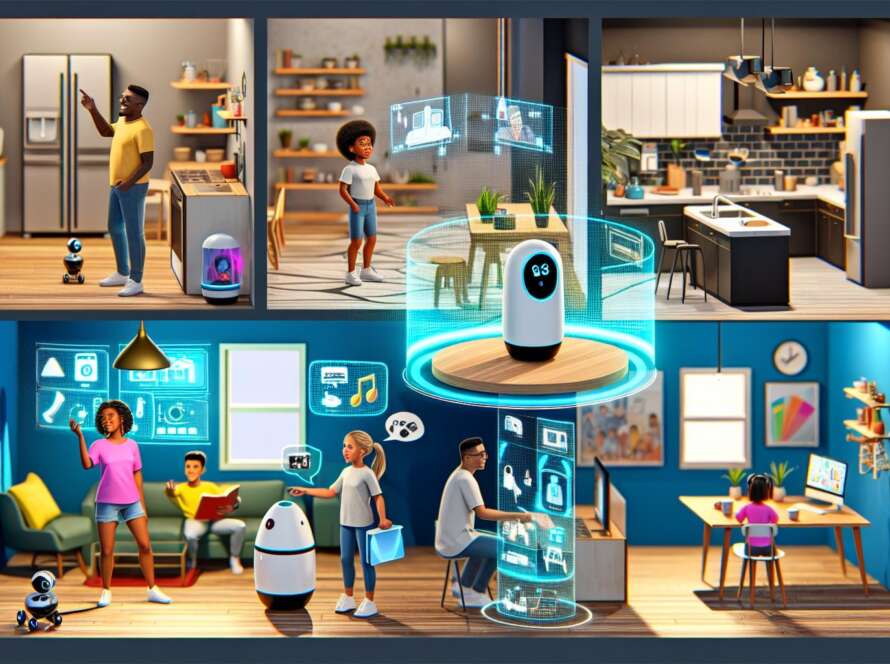In a world where technology is constantly evolving, artificial intelligence has emerged as a game-changer with its promise of streamlining and simplifying our daily lives. From smart assistants to automated processes, AI has revolutionized the way we work, communicate, and even relax. This article takes a closer look at the impact of artificial intelligence on our everyday activities, exploring the convenience it offers and how it has become an integral part of our modern society.
Table of Contents
- Revolutionizing Industries with AI Automation
- The Impact of AI on Everyday Life
- Challenges and Ethical Considerations in AI Development
- Leveraging AI for Personal and Business Efficiency
- The Future of AI: Opportunities and Risks
- Empowering Society through Accessible AI Technology
- Future Perspectives

Revolutionizing Industries with AI Automation
Artificial intelligence (AI) has become a game-changer across various industries, revolutionizing traditional processes and operations. With the rise of AI automation, businesses are experiencing unprecedented convenience and efficiency, resulting in improved productivity and cost savings. From customer service chatbots to predictive analytics, AI is transforming the way industries operate and deliver value to customers.
One of the key advantages of AI automation is its ability to streamline repetitive tasks, allowing employees to focus on more strategic and creative initiatives. By leveraging machine learning algorithms, businesses can automate data analysis, anomaly detection, and decision-making processes, leading to faster and more accurate results. This not only enhances operational efficiency but also reduces the margin of error, resulting in better service delivery and customer satisfaction.
Moreover, AI-driven automation has made significant strides in personalizing customer experiences through targeted marketing campaigns and product recommendations. By analyzing vast amounts of customer data, AI algorithms can identify patterns and preferences, enabling businesses to tailor their offerings to individual needs and preferences. This level of personalization not only enhances customer engagement but also boosts sales and revenue for companies in various industries.
In today’s fast-paced and competitive business landscape, staying ahead requires embracing the capabilities of AI automation. By integrating AI technologies into their operations, businesses can unlock new opportunities for growth and innovation while delivering unparalleled convenience and value to their customers.
The Impact of AI on Everyday Life
AI is rapidly changing the way we live, work, and interact with the world around us. From virtual assistants and smart homes to personalized recommendations and autonomous vehicles, the impact of artificial intelligence on everyday life is undeniable.
With the automation capabilities of AI, mundane and repetitive tasks can be handled more efficiently, allowing individuals to focus their time and energy on more meaningful endeavors. Whether it’s scheduling appointments, managing finances, or even driving, AI-powered technologies are streamlining processes and providing unparalleled convenience for users.
In addition to automation, AI has also revolutionized the way we interact with technology through intelligent assistants and chatbots. These tools can understand and respond to natural language, making it easier than ever to find information, make purchases, and access services. As a result, the most used prompts in the world are now just a voice command or text away, making everyday tasks more accessible and convenient than ever before.
It’s clear that AI has become an integral part of our daily lives, and its influence will only continue to grow in the future. From simplifying tasks to enhancing accessibility, the impact of artificial intelligence on everyday life is shaping a more efficient and interconnected world.
Challenges and Ethical Considerations in AI Development
Artificial Intelligence (AI) has undoubtedly revolutionized the way we live, work, and interact with technology. From voice-activated virtual assistants to personalized product recommendations, AI has made automation and convenience accessible to all. However, the development and implementation of AI technology come with their own set of challenges and ethical considerations that must be carefully navigated.
One of the primary challenges in AI development is ensuring the security and privacy of user data. As AI systems become more sophisticated and interconnected, the risk of potential data breaches and privacy violations increases. Developers must prioritize the protection of user data through robust encryption and cybersecurity measures to safeguard against unauthorized access and misuse.
Another ethical consideration in AI development is the potential for algorithmic bias and discrimination. AI systems are designed to make decisions and predictions based on patterns and data, but if the underlying data is biased, the AI system may perpetuate or exacerbate existing social inequalities. It is crucial for developers to actively mitigate bias in AI algorithms to ensure fair and equitable outcomes for all users.
Moreover, the ethical implications of AI use in sectors such as healthcare, finance, and criminal justice demand careful consideration. AI-based systems have the potential to significantly impact people’s lives, and it is essential to uphold ethical standards to ensure that AI technologies are deployed responsibly and ethically.
Today’s best AIs in one place, assistants, the most used prompts in the world and the most complete newsletter – in a single subscription.
Leveraging AI for Personal and Business Efficiency
AI is revolutionizing the way we work and live, offering unprecedented automation and convenience that can benefit both individuals and businesses. Leveraging AI can lead to increased productivity, time-saving, and improved decision-making. With AI, we can accomplish more in less time, allowing for a more efficient use of resources and a more streamlined workflow.
One of the key advantages of AI is its ability to automate repetitive tasks, freeing up time for more strategic and creative activities. Whether it’s automating customer service inquiries or streamlining inventory management, AI can help businesses and individuals focus on higher-value tasks and improve overall efficiency.
AI-powered personal assistants offer unmatched convenience, offering a wide range of capabilities to help manage daily tasks and improve productivity. From setting reminders and managing calendars to answering questions and providing personalized recommendations, AI assistants are becoming an indispensable tool for staying organized and efficient.
By subscribing to our newsletter, you can stay up to date with the most advanced AI solutions and learn how to leverage AI to improve personal and business efficiency. Our newsletter is the most complete resource for staying informed about the latest AI trends, technologies, and best practices. Subscribe today for access to the most advanced AIs in one place and the most used prompts in the world.
The Future of AI: Opportunities and Risks
The future of AI is filled with endless possibilities, offering both great opportunities and potential risks. As AI technology continues to advance, it has the potential to revolutionize various industries, making processes more efficient and convenient. From automated customer service chatbots to personalized shopping recommendations, AI has the power to enhance the way we live and work.
With the integration of AI, businesses have the opportunity to automate repetitive tasks, allowing employees to focus on more strategic and creative endeavors. This not only increases productivity but also improves overall job satisfaction. Furthermore, AI can provide personalized experiences for consumers, offering tailored recommendations and insights based on individual preferences.
However, as AI becomes more prevalent, there are also potential risks to consider. From job displacement to bias in algorithms, there are ethical and societal concerns that need to be addressed. Additionally, the reliance on AI for decision-making processes raises questions about accountability and transparency. It’s crucial to carefully consider the implications of AI and work towards creating responsible and ethical AI systems.
By understanding the opportunities and risks associated with AI, we can work towards harnessing its potential for the greater good while mitigating potential drawbacks. As AI continues to shape the future, it’s important to remain proactive in addressing the challenges and leveraging the opportunities it presents.
Empowering Society through Accessible AI Technology
AI technology is a game-changer for society, offering automation and convenience for people from all walks of life. With accessible AI tools, society can experience a transformation that empowers individuals and communities to achieve more and streamline everyday tasks. From smart home devices to advanced digital assistants, AI technology is revolutionizing the way we live and work, making tasks more manageable and improving overall quality of life.
One of the key benefits of accessible AI technology is its ability to level the playing field for individuals with disabilities. With AI-powered tools, people with physical or cognitive limitations can access information, communicate, and interact with the world in ways that were once impossible. This level of inclusion is crucial for creating a more equitable society where everyone has the opportunity to thrive.
Another area where accessible AI technology is making a significant impact is in education. AI-driven tools can provide personalized learning experiences, adapt to individual student needs, and offer valuable support for both students and teachers. This technology has the potential to revolutionize education and provide more accessible and effective learning experiences for students of all abilities.
is not just about convenience, but about creating a more inclusive and equitable world for all. As AI technology continues to advance, it’s essential to prioritize accessibility to ensure that everyone can benefit from these innovations. By embracing accessible AI, society can move towards a more inclusive future where everyone has the opportunity to thrive.
Future Perspectives
As we continue to witness the rapid advancement of artificial intelligence, it’s clear that the future holds endless possibilities for automation and convenience in all aspects of our lives. From personalized recommendations to autonomous vehicles, AI is set to revolutionize the way we live and work. While there are concerns about the potential impact on jobs and privacy, the potential benefits of AI cannot be ignored. As we navigate this new era, it’s important to consider the ethical and societal implications of AI while embracing the opportunities it presents. With careful consideration and responsible development, AI has the potential to propel us towards a future of unprecedented convenience and efficiency for all.





